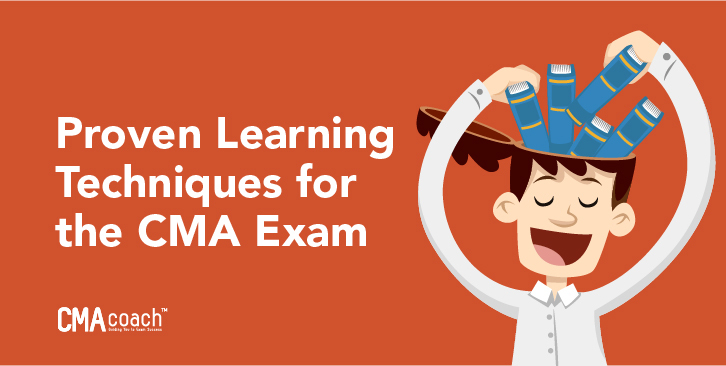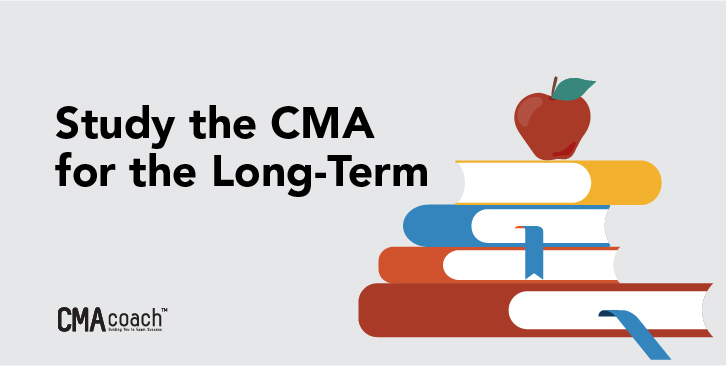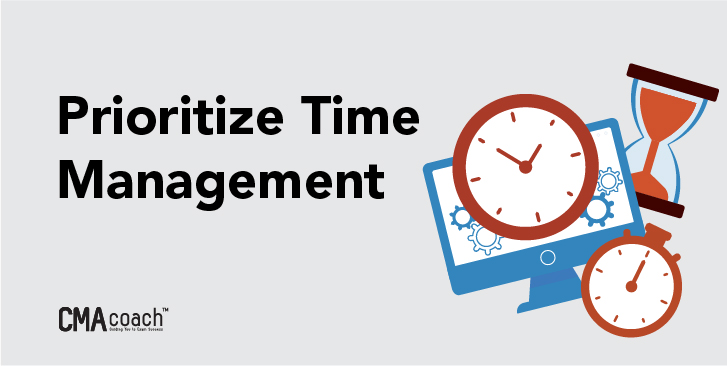While I wish I could say that there are shortcuts to study for the CMA exam – magic learning tips that will guarantee success and take the grueling effort out of studying – the truth of the matter is, studying for the CMA exam is hard work.
These study tips certainly won’t cut the time and effort that goes into effectively preparing for the exam. But, I assure you that if you follow these few techniques and a solid CMA study guide, you will walk into that exam room with confidence. It’s worth it!
Study the CMA for the Long-Term
AKA: Don’t cram! I know you’ve heard it time and time again, but it’s true!
Cramming has been proven to be a very ineffective way to study, especially when tackling a long, difficult, and involved exam like the CMA exam.
Studying over a period of time ensures that you don’t just memorize information for the short term, but actually have time to really process it all so that you truly understand what you’ve learned.
Another bonus to making studying a long term commitment is that rather than forgetting everything you’ve learned almost immediately after taking the exam (as is often the result of late-night cram sessions), you will carry this useful knowledge with you through your exam and into your career as a CMA.
Isn’t that what it’s all about?
Prioritize CMA Time Management
Time management is absolutely key to studying for a difficult exam such as the CMA. There’s simply no way around it if you want to be the most confident you can be on exam day.
I recommend a 16-week study plan as the optimal plan.
Taking 16 weeks to study for each part of the exam (16 weeks for part one, and 16 weeks for part two) gives you ample time to learn everything you need to know for the CMA exam without dragging on so that you forget everything you learned at the beginning of your studies by the time the exam comes around.
I for instance spent about 6 months total, studying for the exam 6 days a week, taking 3 months to study for each exam part.
During the weekdays I studied after work at Starbucks for 3-4 hours max each day, taking a 10-minute break each hour.
On Saturdays I studied at a Starbucks 3 hours in the morning, 4 hours in the afternoon, and 3 hours at night, taking a 10-minute break each hour.
Sundays were my day to rest and spend time with family and friends.
To keep yourself on track when studying for the exam, you may find it extremely beneficial to plan out your study time: make study appointments. Mark your calendar with how long you plan to study each day and stick to it!
It is also equally important to make sure you:
Rest and Relax – Don’t Study All the Time!
Rest and relaxation are crucial to retaining what you’ve learned – this is very difficult to do when your mind is on overload.
The brain often works out problems and logs away information in diffuse mode when you aren’t focusing so hard.
Study Breaks:
One way to make sure you are getting enough time to refresh and prevent burn out is to schedule in your study breaks. Scheduling break time will ensure that you allowing yourself time to destress without getting thrown off track.
As you can see from my study schedule, I made sure to plan study breaks each hour. You may find it beneficial to study for 20-minute increments, taking 5-minute breaks.
Everyone is different. Find what works best for you.
Take a day off:
In addition to small breaks throughout your study time, I recommend taking one day off from studying per week to reboot. Spend this day doing things you enjoy and spending time with family and friends.
Remember, spending real-time with loved ones face to face will provide you with calming oxytocin and serotonin boosts that you won’t get from social media.
Sleep:
And of course, be sure you are getting plenty of much-needed sleep in order to rejuvenate your mind!
Sleep is when short term memories and transformed into long term memories. So ditch the all-nighters – they are detrimental to your ability to properly process and retain information!
With the commitment and discipline, you will master these study techniques and crush the CMA exam!

Hi, I’m Nathan Liao (aka the CMA Coach)! For the last 10 years, over 82,000 accounting and finance pros came knocking at my door seeking guidance and help. If you’re also aiming to conquer the CMA exam on your very first try—without wasting away time or money—you’ve found your ultimate guide. Dive in deeper to discover more about me and the dedicated team that powers CMA Exam Academy. Click here and let’s embark on this journey together!






2 Comments on “Proven Learning Techniques for the CMA Exam”
Pingback: CMA Exam Tips for the Upcoming Testing Window
Pingback: Taking the CMA Exam In 2015? Here's Your Roadmap